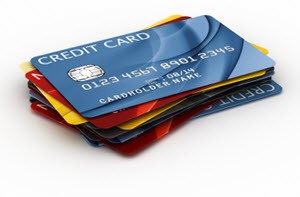Taking expensive loans
Borrowing money can be a great idea in some situations and a horrible idea in others. Below, we will take a look at few common mistakes that you better avoid if you want to avoid expensive loans. Just like you strive to learn more about savings and investments, you should strive to learn about credit – preferably before you need it.
Common mistake: Not shopping around for credit
 A very common mistake is to not shop around for credit. When we need a house mortgage, we automatically contact the bank where we have our savings accounts. When we need short-term credit, we whisk out that old trusty credit card that we got back in college, without checking if better forms of short-term credit might be available to us now. When we need a car loan, we obediently fill out the loan application placed in front of us by the car salesman, without even considering that there might be other lenders out there that would give us a better car loan offer even though they aren’t affiliated with this specific car dealership.
A very common mistake is to not shop around for credit. When we need a house mortgage, we automatically contact the bank where we have our savings accounts. When we need short-term credit, we whisk out that old trusty credit card that we got back in college, without checking if better forms of short-term credit might be available to us now. When we need a car loan, we obediently fill out the loan application placed in front of us by the car salesman, without even considering that there might be other lenders out there that would give us a better car loan offer even though they aren’t affiliated with this specific car dealership.
Our advice is: Shop around for credit and don’t be afraid to negotiate and pit different lenders against each other. This is true regardless of what kind of credit you need. Even if you are in dire straits and all you can be approved for is a payday loan or similar, you should still put some effort into making sure that you get the best quickie loan possible. You can for instance use a comparisons site such as nyasmslån.com to make the quest easier. We encourage you to use more than one comparison site, because each site only work together with a limited number of loan providers.
Common mistake: Being so afraid of credit that you only apply for it when you desperately need it
Believing that credit should be avoided unless it’s absolutely necessary can actually end up costing you a lot. While it might seem smart to not apply for any type of credit, it can create a situation where you – when you urgently do need credit – have to make do with pretty lousy credit options. When it comes to emergency loans such as payday loans, even the cheapest loan will be expensive.
 It is generally a good idea to be pro-active and apply for a line of credit even if you don’t need it. Better to have it an not need it, than to need it and not have it. In an emergency situation, you will probably not have the time nor the energy to shop around, and something might have happened that has caused your creditworthiness to drop.
It is generally a good idea to be pro-active and apply for a line of credit even if you don’t need it. Better to have it an not need it, than to need it and not have it. In an emergency situation, you will probably not have the time nor the energy to shop around, and something might have happened that has caused your creditworthiness to drop.
One way of making sure you do have access to credit if you’re ever in a pinch is to apply for a credit card that has very low or no fees associated with just having it, and that will not charge you any interest rate as long as the debt is paid in full each month. To build a good relationship with the credit card company and show that you can handle credit, use the credit card to pay for a few necessary expenses each month, such as rent and utilities. When the bill comes, always pay off the entire debt.
Common mistake: Not actively working to improve your credit report / credit score
In some countries, fairly detailed credit reports is the norm. In other places, such as the United States, your credit score – which can be described as a summarized version of your credit report – will be very important.
Regardless of what’s applicable where you live, you should find out more about how your creditworthiness is calculated and see what you can do to improve your overall creditworthiness. Improving your creditworthiness is a continuous effort that can be exceedingly awarding, since high creditworthiness can have such a positive impact on a person’s financial wellbeing. You can negotiate lower interest rates on loans, more lenders will be eager to have you as a client, you will be approved for larger loans than someone with poor creditworthiness would, and so on. With poor or mediocre creditworthiness, borrowing money can be very expensive.
Common mistake: Borrowing money for frivolous consumption
We’re not going to claim that it is always wrong to borrow money for consumption. There are many scenarios where using credit to purchase something is the right thing to do, even if that thing is not an investment. However, borrowing money to pay for frivolous consumption can rapidly send you down a rabbit hole of financial chaos. This is true even if the purchase wouldn’t be considered frivolous for someone in a better financial situation. There is a difference between wants and needs.
Common mistake: Not understanding compound interest
Compound interest is a concept that is very important to understand, yet many consumers have a hard time taking compound interest into account when they make financial decisions, e.g. regarding how much to put into the savings account each month or if they should pay their credit card debt in full or keep on pushing part of the debt in front of them.
We also advice everyone to learn about the following concepts:
- Simple interest
- Effective interest rate
- Annual percentage rate (APR)
This article was last updated on: April 8, 2016